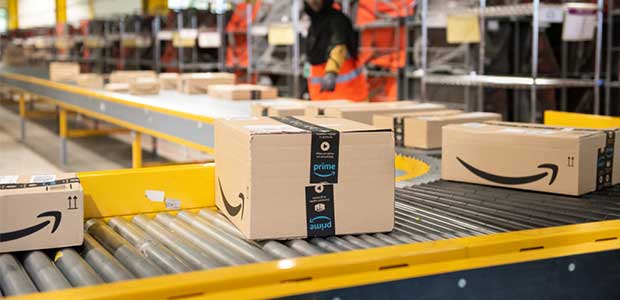
Amazon Workers Being Worked Overtime for COVID-19
Workers for Amazon and Whole Foods are struggling to keep up with the world’s hectic pace and high grocery demands—and their physical and mental health are paying for it.
As coronavirus spreads across the US, Americans are stockpiling groceries and ordering just about anything online. Many workers for Amazon, and Whole Foods, are being squeezed to keep up with increasing demand from the stockpiling and ordering—and being told that’s just the way it is.
Amazon, as the world’s largest online retailer, also owns Whole Foods, the largest natural foods grocer in the US and fifth largest in the world.
Workers for both groups say their mental and physical health are taking a hit as a result of the high demands, and this is on top of the worries and coping problems they have with the pandemic. In fact, Amazon and Whole Foods is having their workers do the opposite of what most other companies are asking their workers to do.
“My kids are off from school. A lot of businesses are letting workers work from home. But Amazon workers are going in extra time, we’re doing the opposite of what everybody else is doing and due to the nature of our work, it’s hands-on. We have to do that,” said an Amazon warehouse worker in Troutdale, Oregon, who requested to remain anonymous for fear of retaliation.
“I usually work 40 hours a week, four 10-hour shifts. We’ve all been called in for a mandatory extra day, a 10-hour shift, which is usually reserved for holiday peak season,” the worker added.
Another worker says they are worried about having to continue working because they have a family member who is immunocompromised.
“There are people coughing in here. There aren’t paper masks. We are getting unlimited unpaid time off, but I still need to pay bills and rent. I can’t take that unpaid time off,” they said.
Yep—Amazon offered all warehouse workers unlimited unpaid time off through the month of March, and announced last week workers diagnosed with coronavirus or placed into quarantine would receive up to two weeks of paid sick leave. But that time off is not paid, and this month has already been demanding for the workers.
The paid sick leave bill currently being pushed through Congress exempts workers at Amazon and other large corporations from protections. But workers are demanding commitments to pay Amazon warehouse workers if the spread of the virus leads to temporary closures of warehouses.
Some Amazon workers have criticized the company for continuing to operate warehouses while local schools are closed.
“What good is it if schools are closed, kids are home and parents still have to work, if parents catch the virus and bring it back to the household? Then everyone has a virus that they cannot pay for, because a lot of people don’t have health insurance,” said an Amazon associate in Sparrow Springs, Maryland, where workers are also being called in to work overtime shifts. All public schools in the state are closed until 27 March. “It’s careless. They don’t care about people’s safety.”
They said the warehouse ran out of protective gloves for them to wear the past couple days. “The current work environment is going to cause my co-workers and I to become sick, if they aren’t already, from overwork, stress and lack of protections.”
An Amazon spokesperson said in an email: “The health and safety of our employees and contractors around the world continues to be our top priority. As communities around the world are requiring social distancing, we’re seeing that our teams—much like grocery stores, pharmacies and other essential services—have a unique role getting customers the critical items they need and this is especially vital for the elderly, people with underlying health issues, and those sick or quarantined.”
On March 16, Amazon announced all its employees, include those at Whole Foods, will temporarily be paid an additional $2 an hour through the end of April. The company also announced plans to add 100,000 workers to meet demand throughout the coronavirus outbreak.
Whole Food workers said these workloads and customer demands are very similar to those during busy holidays, like Thanksgiving.
Whole Worker, a group of Whole Foods workers, started petitions calling for a sickout protest on May 1—for Whole Foods to reinstate health insurance benefits for part-time workers, and to provide Whole Foods workers with expanded paid sick time during the outbreak.
In an internal email sent to Whole Foods employees from the Whole Foods CEO, John Mackey, on March 11, employees were encouraged to donate paid time off for team members with a medical emergency or death in their immediate family.
“In the midst of all this, they started handing out these availability forms stating that if we are not able to work 70 percent of the peak hours we would lose our full-time status, therefore losing all health benefits,” said a Whole Foods worker in Los Angeles, California. “They have us scrambling to place bigger and bigger orders with not enough people to work the loads, so they are asking everyone as a favor to stay and work overtime. All customer service and retail workers should be getting hazard pay in a pandemic and Amazon can afford to do it, but they won’t.”
Still, workers say it’s almost impossible to meet customer demand and keep the workplace sanitary.
As this outbreak continues to unfold, remember the people on the front lines of getting you what you need: the delivery service workers and the grocery store workers, the healthcare workers and the cleaning service workers. Many are working extremely hard to keep up—and risking their health and lives.